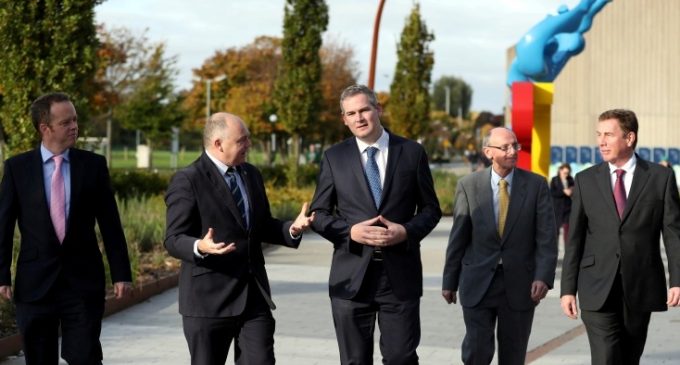Launch of €6.7 Million Climate Change Research Initiative Led by University College Dublin

The Government has officially launched the 5-year Acclimatize project (www.acclimatize.eu/), a new €6.7 million climate change research initiative, with Professor Andrew J. Deeks, President, University College Dublin (UCD). The project has been part-funded by the European Regional Development Fund through the Ireland Wales Programme 2014-2020.
The overall objective of the project, led by UCD in partnership with Aberystwyth University, is to improve the quality of coastal waters in both Ireland and Wales, boosting local tourism and supporting marine industries, such as shellfish harvesting.
The goal of the Acclimatize project is to identify pollution streams and their impact on coastal waters, in both urban and rural settings, and the impact of climate change on pollution.
With this data real-time models will be developed to inform the effects of climate change, through altered weather patterns, including rainfall, temperature and tides which impact the quality of water in coastal areas.
The project aims to develop a range of practical management methods, including smart real‐time predictive tools, to improve the quality of such coastal waters to ensure compliance with regulations to protect human health and the marine environment.
Seán Kyne TD, Minister of State for Community Development, Natural Resources and Digital Development, said: “With Budget 2018 we have secured a 43% increase in funding for energy and climate action initiatives to help us on our journey to a low carbon economy. Research initiatives such as Acclimatize are very important in assisting Government and other stakeholders in making informing decisions which maximise the effectiveness of the funding available. Acclimatize is also a very positive example of how EU funds are being are being used to support local economies to address pollution in our coastlines and mitigate the impacts of climate change.”
Professor Andrew J. Deeks, President, UCD, said: “University College Dublin is delighted to be taking part in another collaborative partnership with Aberystwyth University. The ability to sustain our environment, to use natural resources wisely and to manage waste is central to our society and economy. In this regard the Acclimatize research project, which we are officially launching today, will help to bridge the knowledge gap in relation to the pollution of at-risk bathing waters in Dublin Bay, and in a number of bays around Wales, by identifying and quantifying the pollution streams entering these bays and determining the impact on these waters through a dynamic period of climate change.”
The Acclimatize project will focus on designated and ‘at-risk’ bathing waters in two complementary environments, a large scale urban and a rural agricultural environment.
The large scale urban environment is represented in the project by ‘at-risk’ bathing waters in Dublin Bay (Sandymount, Merrion and Dollymount strands), whereas the rural agricultural environment will focus on ‘at-risk’ bathing waters in Wales; Wiseman’s Bridge (Pembrokeshire), Newquay North and Aberystwyth South (Ceredigion, Aberdyfi (Gwynedd) and Rhyl (Denbighshire).
Initial fieldwork at Cemaes Bay in Anglesey was successfully completed in the 2017 bathing season and provides an excellent platform on which to build predictive modelling. This has already been presented to the international science and policy communities with an invited keynote talk in New Zealand in September 2017. It was also presented in a report to the WHO and EU on the science-base supporting revision of the WHO and EU water quality criteria for bathing waters which will be considered by international experts in early 2018.
Professor Wim Meijer, Head, UCD School of Biomolecular and Biomedical Science, who is leading the Acclimatize project, said: “Climate change is predicted to produce more weather extremes and, in particular, storminess in North West Europe including the Irish Sea. This will have negative impacts on coastal water quality in the period to 2100 which will threaten the sustainable use of coastal waters which form the economic basis of coastal tourism and shellfish harvesting industries.”
He added: “Improvement of bathing waters is often complicated, or prevented altogether, by a lack of knowledge of the pollution streams that contribute to non-compliance. Climate proofing of regulatory and infrastructural decisions affecting bathing water quality is therefore a policy challenge urgently needing the policy evidence-base which we will provide in the Acclimatize project.”
Professor David Kay, Centre for Research into Environment and Health, Department of Geography and Earth Sciences, Aberystwyth University, who is leading the project in Wales, said: “The first year of Acclimatize in Wales is progressing well with excellent support from relevant local authority and resource agency partners. The Acclimatize Cemaes Bay study location was chosen to assist with sustainable compliance of this site against the EU bathing Water Directive using the latest real-time modelling strategies to protect public health through cutting-edge modelling and management approaches.”
“The work has generated significant international interest already and early field data have been communicated to the WHO and EU policy and scientific communities including a presentation to the UK inter-agency bathing waters biennial conference in November 2017 in Wrexham. Follow-on work at additional sites, together with an examination of climate change impacts, will commence with our project partners in the autumn of 2017.”
Professor William Gallagher, Director of the UCD Conway Institute in which Professor Meijer is one of over 90 Conway Fellows, commented, “The Acclimatize project builds on years of hard work by Professor Meijer and his colleagues and I am delighted that a Fellow from our Institute is co-leading on such a key European initiative with obvious and tangible impacts on people’s daily lives.”
At UCD Professor Meijer is collaborating with Professor John O’Sullivan, UCD School of Civil Engineering and Professor Gregory O’Hare, UCD School of Computer Science on the Acclimatize project.
CAPTION:
Pictured (l-r) at University College Dublin are Professor William Gallagher, Director, UCD Conway Institute; Professor Andrew J. Deeks, President, UCD; Seán Kyne TD, Minister of State for Community Development, Natural Resources and Digital Development; Professor David Kay, Aberystwyth Universityand Professor Wim Meijer, Head, UCD School of Biomolecular and Biomedical Science, who is leading the Acclimatize project.




















